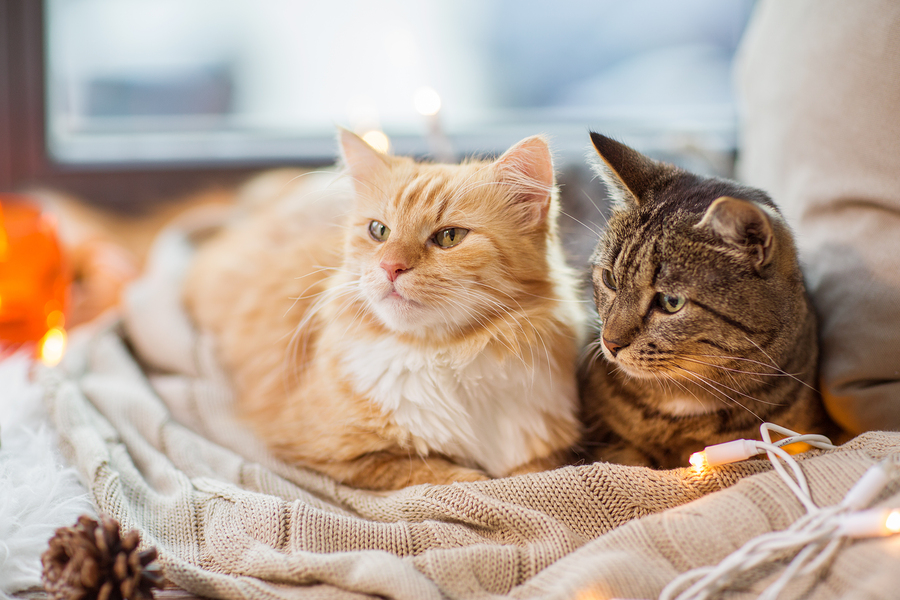Your cat stays indoors only. Do you really need to vaccinate her?
There is no one-size-fits-all answer to this question. You want your cat to be protected from disease, but you don’t want to give her a shot that she doesn’t need. How do you make a good decision for your cat?
The American Association of Feline Practitioners prepares guidelines based on published data, as well as consensus of a multidisciplinary panel of experts in immunology, infectious disease, internal medicine, and clinical practice. It’s my job, and your veterinarian’s job, to put the guidelines into practice for each individual patient.
Vaccines or no vaccines, your cat should visit the veterinarian at least once a year for a full physical exam. Together, you and your veterinarian can determine if your cat needs vaccines and, if so, an appropriate vaccination regimen that will provide the safest and best protection for her.
How Vaccines Work
Vaccines help prepare the body’s immune system by providing protection against a specific disease and infection caused by viruses, bacteria, and a host of other microbes. It does this by stimulating an immune response that will protect your cat if she is subsequently exposed to the disease or infection.
Vaccines contain antigens that look like the disease-causing organism but don’t actually cause disease. This means that if your vaccinated cat is ever exposed to the real disease, her immune system is now prepared to recognize and fight it off entirely or the severity of the illness will be reduced.
What to Consider
Think through some scenarios that might expose your cat to disease. Cats who spend any time outdoors are at greater risk of exposure to many infectious diseases.
Cats housed exclusively indoors generally do not require vaccination beyond feline panleukopenia virus, feline herpesvirus-1, and feline calicivirus. These core vaccines are recommended for every cat, indoor or outdoor, because of the widespread or severe nature of these diseases.
Indoor cats generally have a low risk of exposure to infectious agents, particularly where the disease in question is transmitted only by direct contact among cats. Yet the entire household may be at risk of exposure to additional agents in multiple-cat households where some cats are housed exclusively indoors while other cats are permitted outside unmonitored. Indoor cats may also be exposed by indirect transmission of pathogens brought inside on clothing, shoes, or other ways.
Indoor cats may also benefit from rabies vaccinations and feline leukemia virus (FeLV) vaccinations. Veterinarians often recommend vaccination of the entire household for selected diseases (e.g., FeLV and rabies) if exposure risk is thought to be significant.
Rabies vaccinations are important because cats can become infected from other animals and transmit the fatal disease to humans and other animals. This vaccine is required by law in many states.
Recommendations
The Advisory Panel of the American Academy of Feline Practitioners recommends that all cats under 1 year of age be vaccinated against FeLV and receive a booster vaccination one year later. After 1 year of age, the need for subsequent vaccination is determined by individual risk factors such as whether the cat goes outdoors regularly or fights with unknown or infected cats. The disease can be spread through bites and scratches, mutual grooming, and sharing of food and water bowls or litter boxes.
At least once a year, as part of your cat’s regular veterinary visit, his or her vaccination needs should be reassessed. Below are six good reasons your veterinarian wants you to keep your cat up to date on her vaccinations.
- Your cat can accidentally get outside, where she could come in contact with a stray cat carrying disease or have a run-in with a rabid animal.
- Your cat may go outside for walks on a leash.
- Your cat could inadvertently end up in a shelter where she could come in contact with sick cats.
- Your cat’s lifestyle could change due to divorce, death, or a move. It’s not uncommon for cats who start out living indoors to later become outdoor cats.
- A rabid animal such as a bat or raccoon could enter your home.
- Your state may have laws that require rabies vaccines for cats.
Vaccines are not without risks. Side effects can include lethargy, anorexia, fever, or a local reaction at the site of injection. In rare cases, vaccines can have life-threatening side effects, including anaphylaxis and injection-site sarcoma. Ultimately, with the help of your veterinarian, you will decide if the risk of a life-threatening disease outweighs the risk of a possible vaccine side effect for your particular cat.
This article was reviewed/edited by board-certified veterinary behaviorist Dr. Kenneth Martin and/or veterinary technician specialist in behavior Debbie Martin, LVT.








